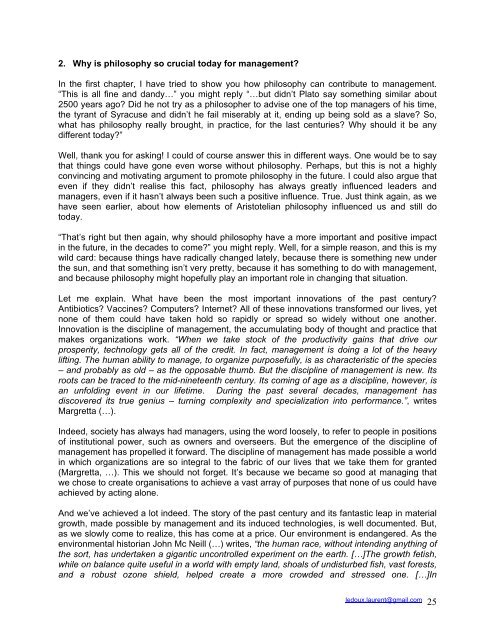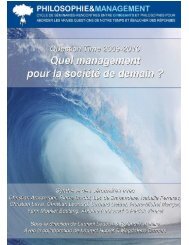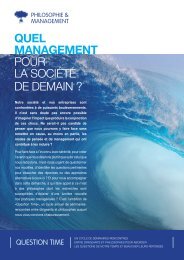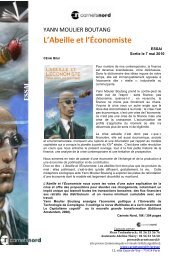Philosophy: The Managers - Philosophie Management
Philosophy: The Managers - Philosophie Management
Philosophy: The Managers - Philosophie Management
Create successful ePaper yourself
Turn your PDF publications into a flip-book with our unique Google optimized e-Paper software.
2. Why is philosophy so crucial today for management?<br />
In the first chapter, I have tried to show you how philosophy can contribute to management.<br />
“This is all fine and dandy…” you might reply “…but didn’t Plato say something similar about<br />
2500 years ago? Did he not try as a philosopher to advise one of the top managers of his time,<br />
the tyrant of Syracuse and didn’t he fail miserably at it, ending up being sold as a slave? So,<br />
what has philosophy really brought, in practice, for the last centuries? Why should it be any<br />
different today?”<br />
Well, thank you for asking! I could of course answer this in different ways. One would be to say<br />
that things could have gone even worse without philosophy. Perhaps, but this is not a highly<br />
convincing and motivating argument to promote philosophy in the future. I could also argue that<br />
even if they didn’t realise this fact, philosophy has always greatly influenced leaders and<br />
managers, even if it hasn’t always been such a positive influence. True. Just think again, as we<br />
have seen earlier, about how elements of Aristotelian philosophy influenced us and still do<br />
today.<br />
“That’s right but then again, why should philosophy have a more important and positive impact<br />
in the future, in the decades to come?” you might reply. Well, for a simple reason, and this is my<br />
wild card: because things have radically changed lately, because there is something new under<br />
the sun, and that something isn’t very pretty, because it has something to do with management,<br />
and because philosophy might hopefully play an important role in changing that situation.<br />
Let me explain. What have been the most important innovations of the past century?<br />
Antibiotics? Vaccines? Computers? Internet? All of these innovations transformed our lives, yet<br />
none of them could have taken hold so rapidly or spread so widely without one another.<br />
Innovation is the discipline of management, the accumulating body of thought and practice that<br />
makes organizations work. “When we take stock of the productivity gains that drive our<br />
prosperity, technology gets all of the credit. In fact, management is doing a lot of the heavy<br />
lifting. <strong>The</strong> human ability to manage, to organize purposefully, is as characteristic of the species<br />
– and probably as old – as the opposable thumb. But the discipline of management is new. Its<br />
roots can be traced to the mid-nineteenth century. Its coming of age as a discipline, however, is<br />
an unfolding event in our lifetime. During the past several decades, management has<br />
discovered its true genius – turning complexity and specialization into performance.”, writes<br />
Margretta (…).<br />
Indeed, society has always had managers, using the word loosely, to refer to people in positions<br />
of institutional power, such as owners and overseers. But the emergence of the discipline of<br />
management has propelled it forward. <strong>The</strong> discipline of management has made possible a world<br />
in which organizations are so integral to the fabric of our lives that we take them for granted<br />
(Margretta, …). This we should not forget. It’s because we became so good at managing that<br />
we chose to create organisations to achieve a vast array of purposes that none of us could have<br />
achieved by acting alone.<br />
And we’ve achieved a lot indeed. <strong>The</strong> story of the past century and its fantastic leap in material<br />
growth, made possible by management and its induced technologies, is well documented. But,<br />
as we slowly come to realize, this has come at a price. Our environment is endangered. As the<br />
environmental historian John Mc Neill (…) writes, “the human race, without intending anything of<br />
the sort, has undertaken a gigantic uncontrolled experiment on the earth. […]<strong>The</strong> growth fetish,<br />
while on balance quite useful in a world with empty land, shoals of undisturbed fish, vast forests,<br />
and a robust ozone shield, helped create a more crowded and stressed one. […]In<br />
ledoux.laurent@gmail.com<br />
25
















